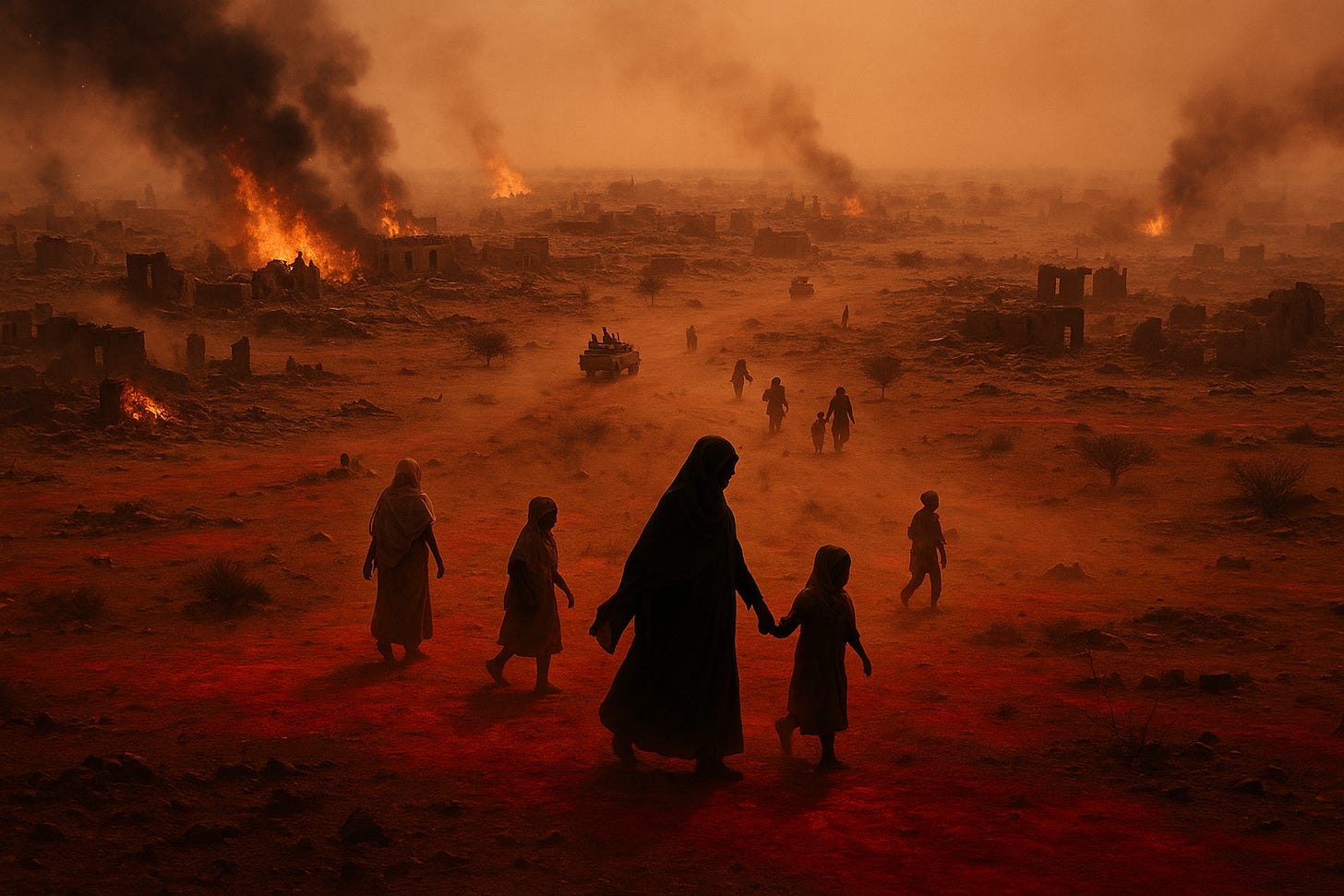The Genocide in Sudan: A Call To Action
The genocide in Sudan is a stain on our collective conscience, and it is imperative that the world responds with urgency and compassion.
Written By: Tonderai Godknows Mapfumo
In a shocking revelation, newly released satellite images from Yale University depicted the harrowing reality of the ongoing genocide in Sudan, specifically in the city of el-Fasher, North Darfur. The images show land stained red – an unmistakable indicator of the bloodshed that has unfolded as the Rapid Support Forces (RSF) militia continues its brutal campaign against the residents of Darfur. This massacre has not only devastated communities but has also raised urgent questions about international complicity and the responsibilities of African leadership.
The context of the conflict
Sudan has long been a nation marred by violence and civil strife, but the current crisis, emerging from the power struggle between the Sudanese Armed Forces (SAF) and the RSF, has escalated to unprecedented levels of brutality. The RSF, a paramilitary group with deep ties to the former regime of Omar al-Bashir, has been accused of committing heinous acts against civilians, including mass killings, sexual violence, and ethnic cleansing.
The historical roots of this conflict can be traced back to the Darfur genocide that began in 2003, where the Janjaweed militia, the precursor to the RSF, was unleashed upon the predominantly non-Arab population of the region. Despite international outcry and some intervention, the underlying issues have remained unaddressed, allowing for a resurgence of violence.
The satellite images: A disturbing reality
The satellite images from el-Fasher serve as a stark reminder of the scale and ferocity of the ongoing violence. Analysts interpret the red stains not merely as a representation of blood but as a symbol of the systemic annihilation of entire communities. These visual testimonies underscore the urgent need for international attention and intervention.
The role of external actors
As the RSF continues its campaign of terror, questions arise about the role of external actors, particularly countries like the United Arab Emirates (UAE) and Egypt, which have been accused of providing military support and arms to the RSF. This complicity raises ethical concerns and highlights the need for accountability.
Despite the overwhelming evidence of atrocities, there has been a conspicuous silence from African leaders and the international community. The lack of condemnation from regional powers is troubling, as it suggests a tacit acceptance of the ongoing genocide. With African nations failing to hold accountable those who enable such violence, the responsibility falls on the shoulders of civil society to demand action.
The response from African leadership
African leaders have largely remained silent in the face of this humanitarian crisis. This silence is deafening, especially given the historical context of African nations rallying against colonial powers and human rights violations. The African Union (AU), which was established to promote peace and security on the continent, has failed to take a decisive stand against the RSF’s actions.
This lack of leadership reflects a broader issue: the need for a redefined approach to governance and accountability in Africa. The continent requires leaders who are willing to prioritize the welfare of their citizens over geopolitical alliances and economic interests.
A call to action
The time for action is now. Africans must unite to call out those countries that are enabling the RSF, particularly the UAE. Civil society organisations, activists, and citizens must raise their voices to demand accountability and support for the victims of this genocide.
International organisations, including the United Nations, must also step up their efforts to address the crisis. A renewed commitment to humanitarian aid, protection of civilians, and pressure on those supplying arms to the RSF is essential.
Conclusion
The images from el-Fasher are not just a testament to the atrocities occurring in Sudan; they are a call to action for all humanity. The genocide in Sudan is a stain on our collective conscience, and it is imperative that the world responds with urgency and compassion. As the situation continues to deteriorate, we must not allow the voices of the victims to be silenced. It is time for accountability, leadership, and a commitment to ensuring that such atrocities are never repeated.
Tonderai Godknows Mapfumo is the Research and Advocacy Officer for COMALISO (Coalition for Market and Liberal Solutions) in Zimbabwe and an Associate of the Free Market Foundation. He writes in his personal capacity.




Horrific ... a perverse cocktail of double standards, hypocrisy, dis-ingenuity with the legacy media outspoken only on preferred issues and effectively not bothering about many others. Good that you are commenting on this.